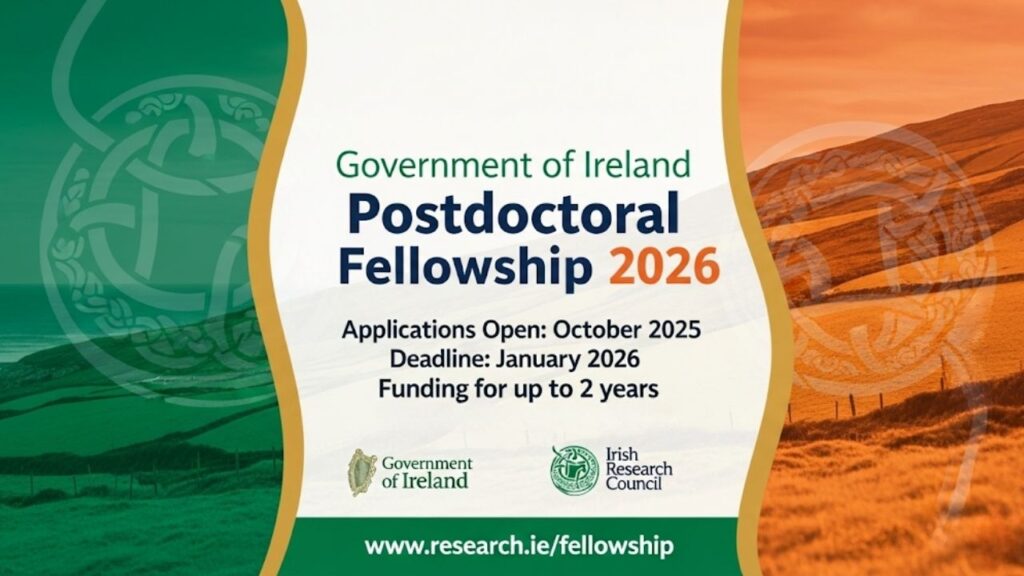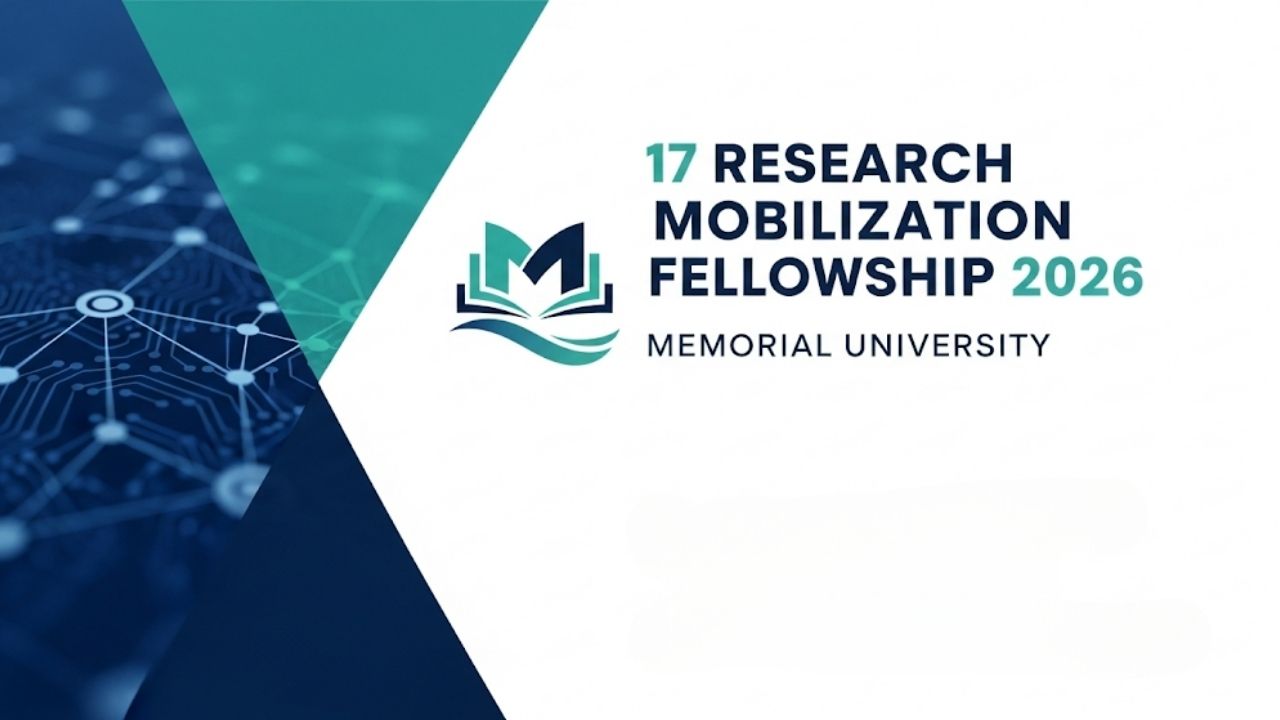Embarking on your journey to secure a Government of Ireland Postdoctoral Fellowship 2026 can feel like a monumental task, but it’s also one of the most rewarding steps in an academic career. This prestigious award, funded by the Irish Research Council (IRC), offers a golden ticket to conduct your own independent research in Ireland for one or two years. You bring the passion and the project; Ireland provides the platform. This guide is designed to be your friendly co-pilot, breaking down the entire process into clear, manageable steps to help you craft an application that truly shines.

Government of Ireland Postdoctoral Fellowship 2026
| Key Fact | Detail |
| Annual Stipend | €42,783 (based on the 2025 call, subject to change) |
| Research Expenses | €5,000 per annum for eligible direct research costs |
| Project Duration | One or two years, full-time, Irish Research Council |
| Key Deadline | Typically mid-October annually (check official site for 2026 dates) |
Securing the Government of Ireland Postdoctoral Fellowship is a marathon, not a sprint. It requires meticulous planning, brilliant research ideas, and a compelling narrative. But it is an achievable goal for talented researchers from around the globe. This fellowship is more than just a line on your CV; it’s an opportunity to immerse yourself in Ireland’s dynamic research culture, gain invaluable experience, and take a significant leap forward in your academic career.
What Makes the IRC Fellowship So Prestigious?
This isn’t just about funding; it’s about freedom and recognition. The Government of Ireland Postdoctoral Fellowship is renowned globally because it places immense trust in the individual researcher. Unlike many postdocs where you work on a pre-defined project, the IRC fellowship empowers you to be the architect of your research.
You get to:
- Propose your own research project in any discipline, from humanities to engineering.
- Choose your host institution from a wide range of eligible Irish universities and research organizations.
- Select your academic supervisor, a mentor who will support your vision.
This level of autonomy is a significant career accelerator. Winning this award signals to the global academic community that you are a researcher of the highest caliber with an innovative and viable project. It’s a stamp of excellence that opens doors for future funding and academic positions.
Are You Eligible for the Government of Ireland Postdoctoral Fellowship 2026?
Before you dive into writing, let’s ensure you meet the fundamental criteria. The IRC has very specific rules, so checking these first will save you a world of time.
The PhD Requirement
To be eligible, you must be a postdoctoral researcher. This generally means you must hold a doctoral degree. According to the terms of the previous call, applicants must have been awarded their PhD within the five-year period before a specific date, or have submitted their thesis and be awaiting their viva voce examination. Make sure to check the official 2026 call documents for the exact dates once they are released.
The ‘Mobility Rule’
This is a crucial point for international applicants. The fellowship is designed to increase the flow of talented researchers to Ireland. Therefore, you cannot have resided or carried out your main activity (work, studies, etc.) in the Republic of Ireland for more than 12 months in the 3 years immediately prior to the call deadline. This rule ensures the program brings fresh perspectives into the Irish research ecosystem. There are exceptions for Irish nationals or residents who wish to return after a period of research abroad.
Finding a Supervisor and Host Institution
Critically, you cannot submit an application on your own. You must secure the agreement of a supervisor at an eligible Irish Higher Education Institution or Research-Performing Organisation before you apply. This person will be your mentor and advocate, and their endorsement is part of the application itself.

Your Step-by-Step Application Roadmap
Okay, ready to tackle the application? Let’s break it down into a clear, actionable plan. In my experience advising aspiring fellows, the most successful applicants are those who start early and approach the process methodically.
Step 1: The Idea — Defining Your Research Project
Your project is the heart of your application. It needs to be original, significant, and feasible within a one- or two-year timeframe. Start by asking yourself:
- What is the key research question I want to answer?
- How does my project build upon, challenge, or advance the current state of knowledge in my field?
- What will be the concrete outputs (e.g., articles, a book chapter, a dataset)?
Step 2: Finding Your Champion — Securing a Supervisor
This step should happen in parallel with refining your idea. A supportive supervisor is non-negotiable.
- How to Search: Begin by exploring the websites of Irish universities like University College Dublin (UCD), Trinity College Dublin (TCD), University of Galway, and University College Cork (UCC). Look for academics whose research profiles align perfectly with your project. Use databases like Google Scholar and Scopus to see who is publishing cutting-edge work in your area.
- Making Contact: Craft a professional and concise initial email. Do not send a generic, mass email. Your message should include:
- A clear subject line (e.g., “Inquiry: IRC Postdoctoral Fellowship Supervision”).
- A brief introduction of who you are and your research background.
- A short, compelling summary of your proposed research project (a one-paragraph “elevator pitch”).
- A clear explanation of why you believe their expertise is a perfect match for your project.
- Attach your CV and a 1-2 page draft of your research proposal.
Step 3: Crafting a Winning Proposal
Your proposal is where you sell your project. The IRC provides detailed guidelines on its structure, which you must follow precisely. Typically, it includes sections on the research question, methodology, state-of-the-art, work plan, and dissemination strategy.
My key tip: Write with absolute clarity. Assume the reviewer is smart but not a hyper-specialist in your niche sub-field. Explain your methodology so clearly that they could almost replicate your study design. Use diagrams or tables to illustrate your work plan and timelines.
Step 4: The Nitty-Gritty — Navigating the Online Portal
All applications are submitted through the Irish Research Council’s online system. Register early to familiarize yourself with the interface. The system requires input from you, your supervisor, and referees. Technical glitches happen, so do not wait until the final day to submit. I’ve seen many brilliant researchers stress unnecessarily by leaving this to the last hour.

Step 5: References Matter — Choosing Your Referees
You will need two referees. Choose them wisely. Your referees should be established academics who know you and your research capabilities intimately—ideally, your PhD supervisor and another senior academic. Contact them well in advance, provide them with your final proposal and CV, and remind them of the deadline. Their letters provide crucial external validation of your potential.
Understanding the Evaluation Criteria
To write a great application, you need to know how it will be judged. The IRC uses a peer-review system and evaluates proposals based on three main pillars:
- Project (50%): The quality, originality, methodology, and feasibility of your proposed research.
- Applicant (30%): Your track record, demonstrated by your publications, conference presentations, and other academic achievements.
- Environment (20%): The quality of your chosen supervisor, host institution, and the plan for your training and career development.
Your Ultimate Guide to American University of Sharjah Fellowships 2026 Open for Applications
Winning the American Dissertation Fellowship 2026: Your Complete Guide
FAQs
Q1:What is the typical stipend for the IRC Postdoctoral Fellowship?
Based on the 2025 call, the salary is €42,783 per year. This is subject to change for the 2026 cycle. The fellowship also includes a contribution to social security costs and €5,000 per year for direct research expenses.
Q2:Can I apply if I haven’t officially graduated with my PhD?
Yes, in previous calls, applicants who had submitted their doctoral thesis and were awaiting their viva voce examination were eligible to apply. However, they needed to have their PhD officially awarded before the fellowship start date. Always check the latest guidelines.
Q3:How do I find a supervisor in Ireland?
Start by researching Irish university websites in your discipline. Look for academics whose work aligns with your interests. Use academic search engines like Google Scholar to find who is actively publishing in your field. A targeted, personal email is the best way to make initial contact.
Q4:Is there an age limit for the fellowship?
No, there is no age limit. Eligibility is determined by the date of your PhD award, not your age. The fellowship is open to researchers at an early stage of their postdoctoral career.










